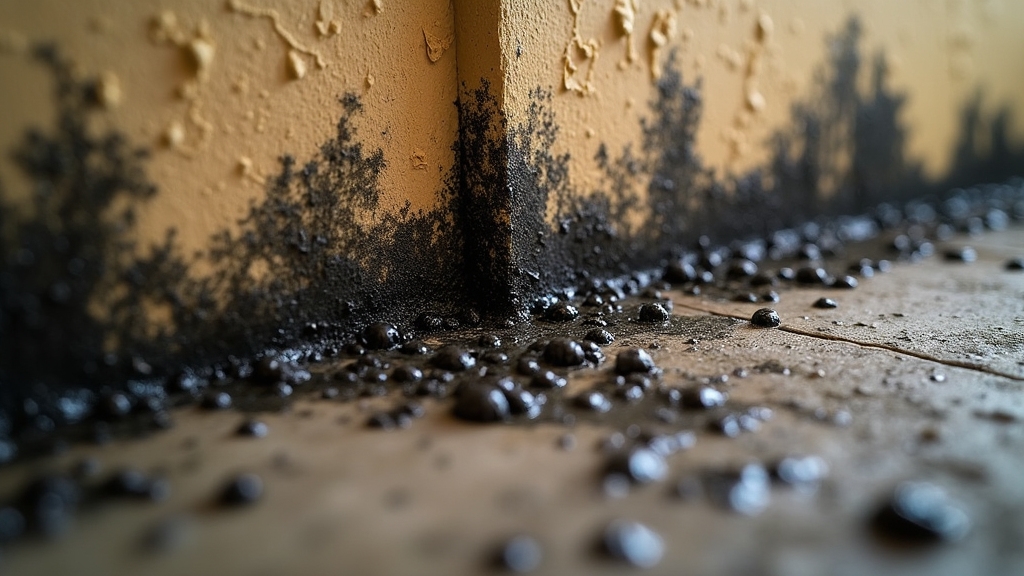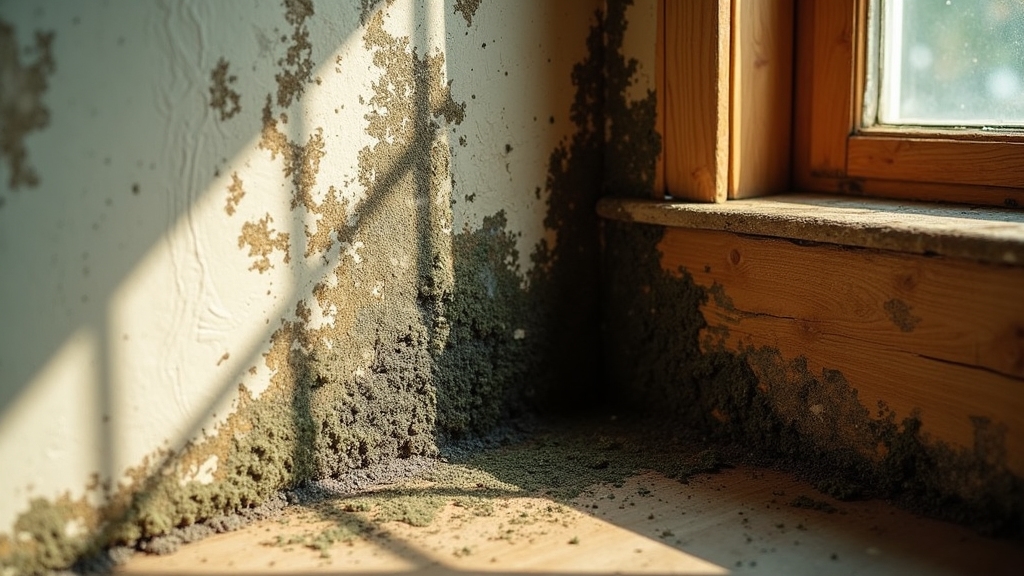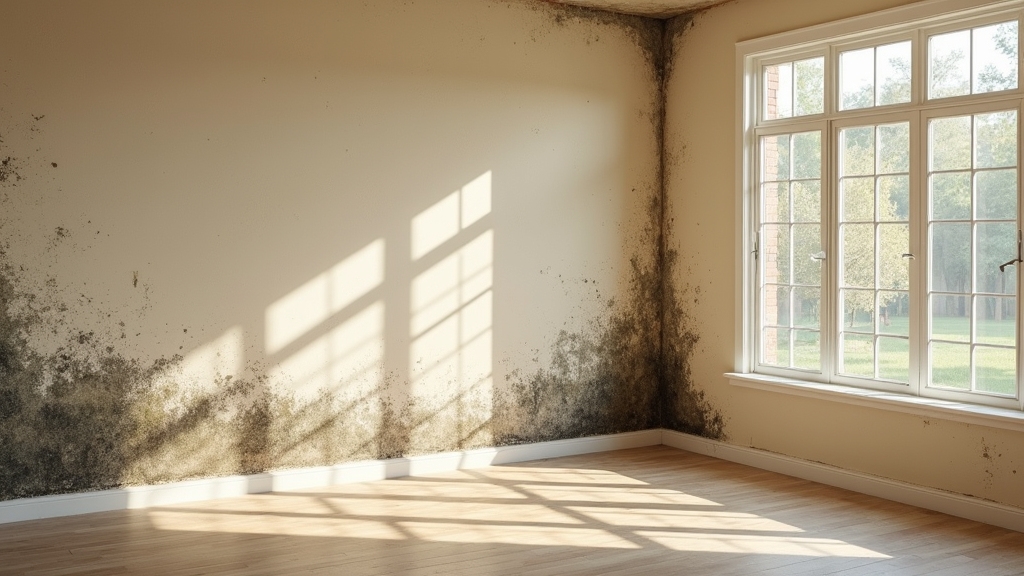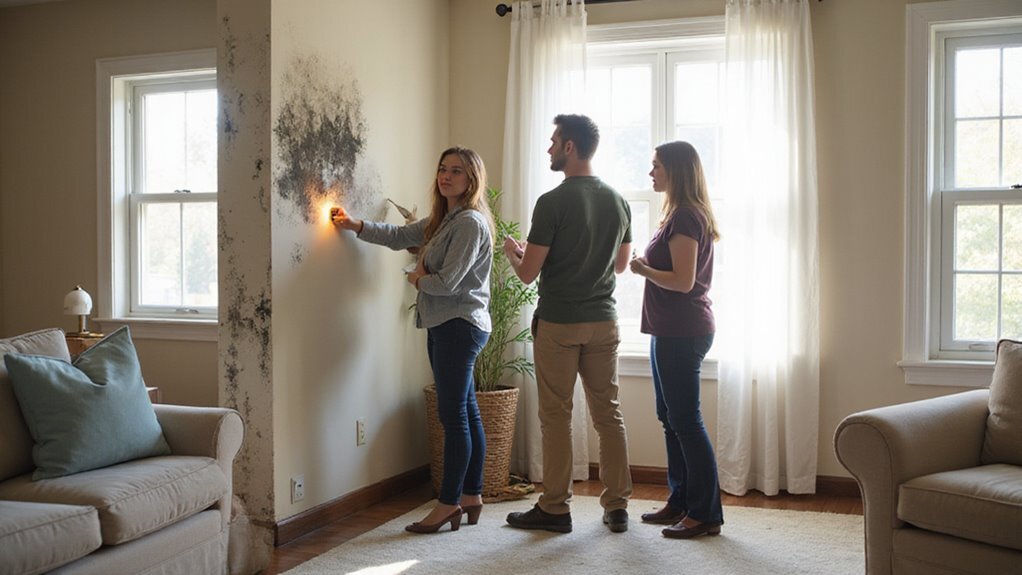Mold in a home can be a major concern for sellers. It can hide in walls, ceilings, or damp places. Many homeowners wonder if they should fix mold before putting their home on the market.
Mold problems can scare away buyers and lower your home’s value. It can also slow down the selling process and cause legal trouble.
Buyers may worry about their health and future repair costs. You should always remediate mold before selling your home to protect its value and avoid major problems.
Taking action now can help your sale go smoothly. It can also build trust with buyers. This blog will guide you through the steps to solve mold issues before you sell your home.
Key Takeaways
- Remediating mold before selling helps maintain your home’s value and avoids costly price reductions or sale delays.
- Prompt mold removal improves buyer confidence and makes your property more attractive in the market.
- Mold remediation protects you from legal issues and fulfills disclosure requirements in most states.
- Addressing mold demonstrates responsible maintenance, reducing buyer concerns over hidden problems or future repairs.
- Neglecting mold can cause inspection failures, health risks, and may discourage potential buyers from making offers.
Understanding Mold and Its Impact on Homes

Mold is important to address when selling your home because it signals hidden problems. Buyers may think there are moisture issues or neglect. This can lower your home’s value and trust. Addressing mold early can prevent structural damage that might otherwise require costly repairs later.
Indoor plants need careful attention. If you overwater them or have poor airflow, mold can grow. Mold can harm surfaces and cause health issues for some people. Proper ventilation and moisture control are essential in preventing mold growth.
You can use mold-resistant paint in areas like bathrooms or basements. This shows buyers you have taken steps to prevent mold. If mold is not fixed, it may delay the sale or cause extra costs. Applying mold-resistant paint in key areas proves to buyers you’re proactive, helping avoid delays and added expenses during your home sale.
Understanding home inspection and its role can help identify hidden mold issues before listing your home. Fixing mold problems quickly helps your home look safe and well-maintained. Buyers want a home that is ready to move in. Addressing mold helps you sell your home faster and at a better price.
Common Causes of Mold Growth
You’ll need to address what’s causing mold in the first place—persistent moisture, poor ventilation, and past flooding are the main culprits. If you ignore these issues, mold will keep coming back no matter how many times you clean it up. Understanding these sources helps you target the root problem and prevent future growth.
Additionally, addressing property conditions like damaged electrical systems can help reduce moisture accumulation that fosters mold development. Monitoring timing considerations can also influence how effectively you manage mold remediation efforts during different seasons.
Persistent Moisture Sources
Persistent moisture lets mold grow inside homes. Mold spores are always around, but they need dampness to spread. If you keep your home dry, mold is less likely to appear.
Leaks from pipes or roofs often cause lingering moisture. Small spills that are not cleaned up can also create damp spots. Bathrooms, kitchens, and basements are common trouble areas.
You should inspect your home for leaks often. If you find moisture, fix it right away to stop mold. Using dehumidifiers can help keep humidity below 60%.
Proper air movement helps dry wet areas faster. If you ignore moisture, mold can return even after cleaning. Mold problems can make your home harder to sell and lower its value.
Poor Ventilation Issues
Poor ventilation can trap moisture in your home. This trapped moisture helps mold grow. Rooms like bathrooms, kitchens, attics, and basements are most at risk.
Condensation on windows or musty smells can warn you of poor airflow. Blocked vents or missing fans make humidity worse. If you notice these signs, mold could start growing.
You should check your home’s ventilation systems often. Make sure vents are clear and fans work well. If you find problems, fix them quickly.
Good ventilation prevents mold and improves air quality. Buyers notice homes with fresh air. Proper airflow also keeps your home healthier.
Flooding and Water Damage
Flooding and water damage can quickly lead to mold growth. Mold often appears within 24 to 48 hours if areas stay wet. Fast drying is the best way to stop mold.
If you notice leaks or damp spots, fix them right away. Moisture in walls, floors, or carpets makes it easy for mold to spread. You should dry all wet materials fully.
Hidden spaces such as crawl spaces and behind walls need careful checking. Mold can grow in these unseen places. Use dehumidifiers and remove all standing water to help prevent problems.
If you plan to sell your home, buyers and inspectors may check for water damage and mold. Addressing these concerns early protects your home’s value. It also shows you care about proper mold prevention.
Health Risks Associated With Mold Exposure
Mold exposure can cause health problems for people of all ages. Mold releases tiny spores into the air that can be breathed in. These spores may cause issues for those with allergies, asthma, or weak immune systems. Visible mold or strong odors are clear indicators that mold may be present, and prompt inspection is essential.
People might notice coughing, sneezing, or itchy eyes when around mold. Even healthy individuals can develop breathing problems if exposed to high levels of mold. Children and older adults are especially at risk. Ignoring mold in your home puts your family’s health in danger. Symptoms of mold exposure include coughing, wheezing, skin irritation, sinus congestion, and fatigue.
These issues can also cause emotional distress, such as anxiety and frustration. Mold remediation is crucial to prevent long-term health effects and to ensure a safe living environment. If you want to protect your home’s air quality, you need to address mold problems quickly. Prompt action can help keep your family safe. Mold should never be ignored.
How Mold Affects Home Value

When mold is present, you’ll see a direct impact on your home’s appraisal price, often leading to lower valuations. Buyers lose confidence quickly if they suspect mold issues, which can result in fewer offers or demands for significant price reductions. Addressing mold early helps you protect your property’s market value and ensures a smoother sale. Implementing swift transactions can also help you avoid prolonged exposure to potential mold problems during the selling process.
Impact on Appraisal Price
Mold can lower your home’s appraisal price. Appraisers see mold as a sign of possible damage and health problems. If they find mold, they may reduce your home’s value to account for repair and cleanup costs.
Using mold-resistant materials during repairs can help your appraisal. These materials show that your home is built to last longer. If you use new mold detection tools, you prove you are serious about preventing future issues.
You should keep records of all mold removal and prevention work. This information helps show your home is a safe investment. If you take these steps, you may keep or even raise your home’s value.
Buyer Confidence Reduction
Mold lowers buyer confidence because it makes people doubt the condition of your home. Buyers may worry that mold means there are other hidden problems. This can lead them to question whether your house is safe.
Buyers often think mold points to poor maintenance. If they see mold, they might suspect you have not taken care of the property. Some buyers could worry about bigger, unseen issues.
Buyers also link mold to possible health risks. They may fear bad air quality or future health problems. Even a small amount of mold can raise these concerns.
If you fix mold problems, you can rebuild trust with buyers. Remediation shows you care for your home. This can help you negotiate a better price.
Legal Disclosure Requirements for Sellers
Sellers must legally share important facts about a property’s condition. This includes telling buyers about mold or past water damage. If you hide this information, you may face legal trouble or lose the sale. A proper disclosure process ensures transparency and legal compliance. Most states require you to disclose known mold problems. You should write down any mold issues and explain what you did to fix them. Even if your state has fewer rules, being honest protects you.
Additionally, conducting a title search before listing can help identify any existing issues that need to be addressed, such as liens or boundary disputes, which could complicate the sale. If you are unsure about what to disclose, ask your real estate agent or lawyer. They can help you follow local laws. Making proper disclosures builds trust and protects you from future problems.
What Home Inspectors Look for Regarding Mold

When a home inspector checks for mold, they’ll focus on any visible signs, such as discoloration or staining on walls and ceilings. You can also expect them to assess areas with moisture issues or past water damage, since these are common sources of mold growth.
By understanding what inspectors look for, you’ll know exactly where to concentrate your remediation efforts. Additionally, they may review areas prone to moisture problems, which are often linked to existing or potential mold issues.
Visible Signs of Mold
Visible signs of mold are the main focus for home inspectors. Inspectors look for clear warning signs during their checks. If there is visible mold, there might be hidden problems too.
Mold stains often appear as dark spots or odd discoloration on walls, ceilings, or baseboards. These stains usually mean moisture is present.
Textural changes can also reveal mold issues. Bubbling paint, peeling wallpaper, or warped drywall may all point to hidden moisture. If you see these, mold could be nearby.
A strong, musty smell is another warning sign. This odor often means mold is present, even if you cannot see it. If your home smells musty, inspectors will take note.
Moisture Sources and Damage
Moisture sources and damage are key factors in mold growth. Inspectors look for leaks, drainage problems, and areas where water gets inside. They also check for signs of water damage like stains or warped wood.
Missing or broken moisture barriers in crawl spaces or basements can cause dampness. Inspectors will note if these barriers need repair. If you fix these issues early, your home will be more appealing to buyers.
Ventilation is important for controlling moisture. Poor airflow can increase humidity and help mold grow. Inspectors will flag areas with bad ventilation or excess moisture.
Buyer Perceptions and Concerns About Mold
Buyers often worry about mold when looking at a property. They see mold as a sign of serious problems. If mold is present, buyers may question the home’s safety and value.
Mold concerns buyers for several reasons. Mold can cause health issues for people with allergies or asthma. It can also point to water leaks or damage behind walls. Home value assessment plays a role in how buyers perceive the severity of mold issues.
If buyers notice mold, they may worry about expensive repairs. They might offer less money or decide not to buy at all. Mold can also make it harder to sell a home in the future.
If you address mold quickly, you can help keep buyers’ trust. Fixing mold problems can protect your home’s value and make a sale more likely. Remediating mold promptly can also prevent disputes over property condition during the sale process.
Costs Associated With Mold Remediation
Mold remediation can be expensive, depending on how much mold is present and where it is found. Small areas with surface mold may cost a few hundred dollars to fix. If you have mold behind walls or in your HVAC system, costs can reach thousands. Properly managing and documenting any remediation efforts can also impact the perception of your home’s value.
Professional services often include inspection, removal, and post-cleaning tests. You may also need to fix leaks or other moisture problems to prevent mold from coming back. If these issues are not addressed, home buyers may lower their offers or walk away. Investing in mold removal helps protect your home’s value. It also shows buyers that your home is safe and well cared for.
If you handle mold early, you can avoid problems during the sale process. Additionally, understanding how inheritance can become marital property might influence future decisions about asset management before selling. Addressing moisture control proactively is essential to prevent recurrence and protect your investment.
DIY Versus Professional Mold Removal
DIY mold removal may save money, but professional help is often safer and more thorough. Choosing between the two depends on the size and location of the mold. Larger or hidden mold problems usually require experts. Speedy transaction process can be achieved more easily when mold issues are professionally addressed beforehand. Small mold patches on hard surfaces can be cleaned by homeowners.
You must wear gloves, masks, and eye protection if you try DIY removal. If the mold covers a large area or is hidden, call a professional. Professionals use special tools to test and find all mold. They follow strict steps to contain and remove mold safely. Some companies even provide warranties and paperwork, which can help when selling your home.
Timing: When to Address Mold Issues
You should schedule a pre-listing mold inspection before putting your home on the market to catch any issues early. Addressing mold upfront prevents last-minute surprises that can delay closing or derail a sale. Acting promptly gives you more control over your timeline and negotiation power.
Pre-Listing Mold Inspection
A pre-listing mold inspection checks for mold problems before you put your home on the market. This step helps you catch hidden mold early and avoid surprises during the sale process. If you address issues first, you can control costs and repairs.
An inspector will look for visible mold and check construction materials for mold resistance. Air quality in your home may also be tested to spot mold spores. If problems are found, you can fix them before buyers visit.
Early action shows buyers you care about the home’s condition. This may help your home sell faster and at a better price. If you fix mold issues before listing, you may have a stronger position in negotiations.
Impact on Closing Timeline
Addressing mold issues early keeps your closing timeline on track. If you handle mold before listing, you avoid unexpected delays. Buyers and lenders often want proof that mold problems are fixed.
If you wait, you may face last-minute repairs or price negotiations. Some buyers might even cancel the sale. Early inspections and cleanup show you are responsible and organized.
Quick, professional action makes buyers feel more confident. It also prevents long discussions about repairs. Solving mold concerns early helps you close the sale smoothly and on time.
Potential Consequences of Skipping Remediation
Skipping mold remediation can cause several problems for home sellers. Mold in a home can lower its value and make it hard to sell. If ignored, mold can harm the health of future owners.
Buyers may not trust sellers who ignore mold issues. Inspectors will often find mold, which can stop a sale from going through. Sellers may have to lower the price or fix the problem later. Ignoring mold can shake buyer confidence, halt sales, and force sellers to reduce prices or make repairs later.
If you do not disclose mold, legal issues may arise. Buyers can sue if they find hidden mold after moving in. This can lead to expensive settlements.
Even if mold is not visible, buyers may still worry about it. Some may choose not to make an offer. Mold problems can affect your reputation and future sales.
How Mold Remediation Can Speed Up the Sale
Mold remediation can help you sell your home faster. Buyers often avoid homes with mold because of health risks and repair costs. If you fix mold problems early, your home becomes more attractive.
A mold-free home is more likely to pass inspections. This can prevent delays or issues during the selling process. You may also avoid price reductions or last-minute repairs.
Professional mold removal shows buyers that you take care of your property. If you invest in remediation, buyers are more likely to trust your home is safe. This may lead to higher offers and quicker sales.
Negotiation Leverage: Mold-Free Homes
A home without mold gives you an edge when negotiating with buyers. Buyers feel more confident about making an offer if the house is mold-free. A mold-free home helps you keep your price firm.
First impressions matter when selling a house. Clean air and well-maintained surfaces show buyers that the home has been cared for. If buyers sense the home is clean, they may decide faster.
Buyers often worry about hidden problems. If there is no mold, buyers do not worry about health risks. You might avoid requests for repairs or price cuts if the home is mold-free.
Choosing the Right Mold Remediation Specialist
Hiring the right mold remediation specialist protects your home’s value and reassures future buyers. Choose someone qualified, as their work affects safety and confidence. Always verify their certifications and experience before making a decision.
A good specialist follows industry standards for containing and removing mold. They should explain how they will prevent future mold, such as using mold-resistant paint or managing moisture. If you have doubts, ask for references or before-and-after photos.
Written estimates allow for easy comparison, but never choose based only on price. Insist on a detailed scope of work that covers both visible and hidden mold. A trustworthy professional will also recommend post-remediation testing to confirm the job is complete.
Conclusion
If you remediate mold before selling, you can avoid many common problems. Buyers may hesitate or lower their offers if mold is present. If you leave the mold, you could even face legal issues after the sale.
If you want a fast, easy sale, Limitless Homes of KC can help. We buy houses for cash, even if they have mold problems. You do not need to worry about repairs or cleaning before selling.
If you are ready to move forward, contact us today. We can make you a fair cash offer and close on your timeline. Let Limitless Homes of KC handle the hard work so you can move on quickly.

